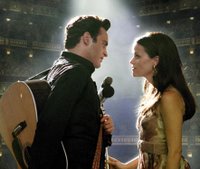
Walk the Line Hollywood loves its biopics, and if you’re going for a real life love story, with two iconic figures, it’s hard to top Johnny Cash and June Carter. While Witherspoon is always solid, here she’s effortlessly charming, and Joaquin Phoenix delivers his best performance to date. I was impressed and surprised by their singing, and Director James Mangold does some subtle and effective work staging the many concerts. However, the film gets repetitive, with Cash getting wasted, promising to clean up his act, and then not doing so, over and over. Related to this, we can see why Cash loves Carter, but we never really get a firm grasp on what Carter sees in Cash. (You can hear director James Mangold on The Treatment here.)

King Kong The real 800-pound, err, 8000 pound gorilla, is Peter Jackson, who is drifting into Lucas territory by not having someone around to say, “we love you, most of it’s great, but you need to cut this, this and this...” King Kong is a good film with some truly great moments — Jackson can deliver horror and action as few can — but it’s about 40 minutes too long. We just don’t need that much set-up or expansion or detail. We don’t need a crewmember subplot. Here’s the deal: The Lord of the Rings was a masterful adaptation, but Jackson and Co. were paring down massive books. Here, he’s pumping up a 100-minute movie! The problem is that King Kong is essentially two basic things: A monster movie with a giant ape, and a love triangle where the twist is that one of the triangle is a giant ape. That’s about it! King Kong demands a few obligatory scenes... the ship voyage, discovery of the island, seeing Kong, rescuing Ann from Kong, Kong running amok in the theater and New York, and dying atop a high New York building. Add some good performances and some nice comic touches to the spectacle, and we’re fine. The sequence with the bugs and “vagina dentata” (as one critic put it) in the pit is horrific (and kudos to getting Andy Serkis on screen in human form!). And the extended sequence of Ann Darrow fleeing a T-Rex, capped with a prolonged, dizzying fight between Kong and not one, not two, but three T-Rexes is cinematic excess of the most glorious kind. Yet Peter — we love you, but trim the script.
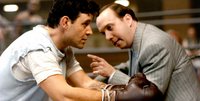 Cinderella Man It was supposed to be a contender, and did decent box office, but it didn’t go the distance. On the one hand, I’m glad, because anytime Hollywood tries to hype and promote its obvious Oscar bait and people don’t bite, it’s a small victory. On the other hand, this really is a pretty good film. While it’s largely by the book, the performances are very good, and I found myself caring about Jimmy Braddock (Russell Crowe) and his family. Crowe may be an ass in real life, but he remains a fine actor. Paul Giamatti is always superb, and after she gets past her initial I’m sucking-a-lemon-and-have-ruined-my-previously-cute-face-with-too-much-plastic surgery shtick, Renée Zellweger delivers a nice performance. Ron Howard shows more cinematic flair than previously in his boxing sequences, and is justifiably proud of them. If Hollywood could always deliver the mostly-predictable this well, it’d be much more palatable. (You can hear Ron Howard on The Treatment here.)
Cinderella Man It was supposed to be a contender, and did decent box office, but it didn’t go the distance. On the one hand, I’m glad, because anytime Hollywood tries to hype and promote its obvious Oscar bait and people don’t bite, it’s a small victory. On the other hand, this really is a pretty good film. While it’s largely by the book, the performances are very good, and I found myself caring about Jimmy Braddock (Russell Crowe) and his family. Crowe may be an ass in real life, but he remains a fine actor. Paul Giamatti is always superb, and after she gets past her initial I’m sucking-a-lemon-and-have-ruined-my-previously-cute-face-with-too-much-plastic surgery shtick, Renée Zellweger delivers a nice performance. Ron Howard shows more cinematic flair than previously in his boxing sequences, and is justifiably proud of them. If Hollywood could always deliver the mostly-predictable this well, it’d be much more palatable. (You can hear Ron Howard on The Treatment here.)  Kingdom of Heaven Ridley Scott’s latest is wonderfully shot as always, and he employs some good actors (Liam Neeson instantly classes anything up, except maybe Krull, but he’s only human!), yet it’s unavoidable that Orlando Bloom is not a leading man. I enjoyed the historical angle of the film, but it’s bad luck for Scott that Bloom’s hot right now, unless he lobbied for Bloom himself versus having the studio pick him. While Bloom is a decent supporting actor, and was quite good as the cerebral and reserved Legolas in Lord of the Rings, he does not have a great deal of range, and he simply cannot carry a film. Note to Hollywood: sell the posters of your boy. But unless you want to keep losing money on him, don’t cast him as the lead! (You can hear Ridley Scott on The Treatment here.)
Kingdom of Heaven Ridley Scott’s latest is wonderfully shot as always, and he employs some good actors (Liam Neeson instantly classes anything up, except maybe Krull, but he’s only human!), yet it’s unavoidable that Orlando Bloom is not a leading man. I enjoyed the historical angle of the film, but it’s bad luck for Scott that Bloom’s hot right now, unless he lobbied for Bloom himself versus having the studio pick him. While Bloom is a decent supporting actor, and was quite good as the cerebral and reserved Legolas in Lord of the Rings, he does not have a great deal of range, and he simply cannot carry a film. Note to Hollywood: sell the posters of your boy. But unless you want to keep losing money on him, don’t cast him as the lead! (You can hear Ridley Scott on The Treatment here.) Sin City While this film is extremely violent, and more to the point, cruel, for the most part its bold style is successful and it's an engaging watch. And like it or not, it's going to be a very influential film for many a young filmmaker. I do wish Frank Miller could get over his whole maiming-dismemberment-cannibalism-castration obsessions, but I'm far too familiar with the Miller canon to expect that any time soon. Basically, all of Frank Miller's work features a tarnished knight, an anti-establishment tough guy who goes over the edge but ultimately for the good guys. The women are all gorgeous and sexy and offer either redemption or betrayal. In this sense, Frank Miller's always been well-suited for pulpy Film Noir with its antiheros and femme fatales. The best segment is the first one with Marv; although it's the most violent, there's a sense of over-the-top fun to it, as he fights to avenge the one woman who's shown him affection. The problem is that some of the most purple prose of the original Sin City graphic novels can sort of skate by when you read it, but can be goddam awful spoken. Early in the film, Michael Madsen says something like, 'Forget it Hartigan. You're pushing 50 and you got a bum ticker.' The audience laughs at it, and we're supposed to, because Madsen delivers the line with a deadpan feel for the comic – it's hackneyed and cheesy but we're all in on the joke and love it. Contrast Madsen with Alexis Bledel's use of the word "ain't" – while she's a fantastic young actress in the screwball comedy Gilmour Girls, her tough talk in the Sin City universe sounds forced and unnatural. Meanwhile, the nadir of the film is surely lines so melodramatic even Clive Owen can't save them: "My warrior woman. My Valkyrie. You'll always be mine, always and never. Never. The Fire, baby. It'll burn us both. It'll kill us both. there's no place in this world for our kind of fire. Always and never. If I have to die for you tonight, I will." The film at its best transforms the original comic books into striking cinema, but its worst moments come from being too slavish to the source material. (Trivia: The segment "guest director" Quentin Tarantino directed is the one with Dwight (Clive Owen) talking to dead Jack (Benicio Del Toro) in the car. You can hear Frank Miller on The Treatment here.)
Sin City While this film is extremely violent, and more to the point, cruel, for the most part its bold style is successful and it's an engaging watch. And like it or not, it's going to be a very influential film for many a young filmmaker. I do wish Frank Miller could get over his whole maiming-dismemberment-cannibalism-castration obsessions, but I'm far too familiar with the Miller canon to expect that any time soon. Basically, all of Frank Miller's work features a tarnished knight, an anti-establishment tough guy who goes over the edge but ultimately for the good guys. The women are all gorgeous and sexy and offer either redemption or betrayal. In this sense, Frank Miller's always been well-suited for pulpy Film Noir with its antiheros and femme fatales. The best segment is the first one with Marv; although it's the most violent, there's a sense of over-the-top fun to it, as he fights to avenge the one woman who's shown him affection. The problem is that some of the most purple prose of the original Sin City graphic novels can sort of skate by when you read it, but can be goddam awful spoken. Early in the film, Michael Madsen says something like, 'Forget it Hartigan. You're pushing 50 and you got a bum ticker.' The audience laughs at it, and we're supposed to, because Madsen delivers the line with a deadpan feel for the comic – it's hackneyed and cheesy but we're all in on the joke and love it. Contrast Madsen with Alexis Bledel's use of the word "ain't" – while she's a fantastic young actress in the screwball comedy Gilmour Girls, her tough talk in the Sin City universe sounds forced and unnatural. Meanwhile, the nadir of the film is surely lines so melodramatic even Clive Owen can't save them: "My warrior woman. My Valkyrie. You'll always be mine, always and never. Never. The Fire, baby. It'll burn us both. It'll kill us both. there's no place in this world for our kind of fire. Always and never. If I have to die for you tonight, I will." The film at its best transforms the original comic books into striking cinema, but its worst moments come from being too slavish to the source material. (Trivia: The segment "guest director" Quentin Tarantino directed is the one with Dwight (Clive Owen) talking to dead Jack (Benicio Del Toro) in the car. You can hear Frank Miller on The Treatment here.)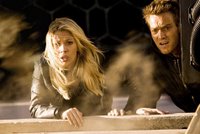 The Island I've resigned myself to the fact that true science fiction in cinema is a rarity, and the genre's most engaging ideas will only appear transmogrified in service of an action blockbuster (we'll see how A Scanner Darkly goes). That being said, I thought The Island was one of Michael Bay's more engaging films. In this case, the ideas copped are cloning and the old Descartes-Philip K. Dick what-is-reality mindfuck theme (there's also some of Plato's "Allegory of the Cave" to it, but George Lucas referenced that more directly with THX-1138). Michael Bay wouldn't know what to do with an actor if one bit him on the ass, but he's all right as long as he gets a good cast, as he does here with Ewan McGregor, Scarlet Johansson, and Michael Clarke Duncan. Basically, the film is an extended chase sequence, watching pretty people in gravity-defying spandex run from the bad guys. Bay is adept at putting together an action sequence, and I found the film enjoyable enough in a summer popcorn flick sort of way until it just got too stupid. I love Djimon Hounsou, and it's not his fault, but his character winds up deliberately killing someone needlessly, and doesn't frisk one of his key captives! That's where the suspension of disbelief shattered for me – I can buy a sci-fi world if it's set up well enough, but if you set up a character as a savvy professional, for god's sake don't have him be that goddam stupid. I don't go into a Michael Bay film expecting to be impressed by the script, but if you've held it together pretty well for 90-some minutes, don't lapse into laziness in the final lap.
The Island I've resigned myself to the fact that true science fiction in cinema is a rarity, and the genre's most engaging ideas will only appear transmogrified in service of an action blockbuster (we'll see how A Scanner Darkly goes). That being said, I thought The Island was one of Michael Bay's more engaging films. In this case, the ideas copped are cloning and the old Descartes-Philip K. Dick what-is-reality mindfuck theme (there's also some of Plato's "Allegory of the Cave" to it, but George Lucas referenced that more directly with THX-1138). Michael Bay wouldn't know what to do with an actor if one bit him on the ass, but he's all right as long as he gets a good cast, as he does here with Ewan McGregor, Scarlet Johansson, and Michael Clarke Duncan. Basically, the film is an extended chase sequence, watching pretty people in gravity-defying spandex run from the bad guys. Bay is adept at putting together an action sequence, and I found the film enjoyable enough in a summer popcorn flick sort of way until it just got too stupid. I love Djimon Hounsou, and it's not his fault, but his character winds up deliberately killing someone needlessly, and doesn't frisk one of his key captives! That's where the suspension of disbelief shattered for me – I can buy a sci-fi world if it's set up well enough, but if you set up a character as a savvy professional, for god's sake don't have him be that goddam stupid. I don't go into a Michael Bay film expecting to be impressed by the script, but if you've held it together pretty well for 90-some minutes, don't lapse into laziness in the final lap. Star Wars: The Revenge of the Sith After Episode I, I promised that if Lucas nailed Episode III, all would be forgiven. All in all, he doesn’t too badly. True, the man cannot write or direct a love scene to save his life (even friendly audiences laugh at them), and he remains much more attentive to complicated CG tracking shots than to human performances. (And has anyone else noticed that apparently turning to the dark side plays hell with your respiratory system? Darth Vader is obvious, but the moment Palpatine physically transforms to Darth Sidious, he develops one hell of a rasp. General Grievious, who appears to have some organic components, has a nasty cough for a robot, and apparently Darth Maul was so far gone in Episode I that without his inhaler he couldn’t even speak. Only Dooku gets off scott-free, but he was a new convert, and doomed anyway. It’s like an insidious subliminal message that smoking is bad for you or something.) That being said, Episode III featured some striking moments. The opening fight between Anakin and Dooku, where Anakin dismembers his foe, is shocking and dark, with Anakin’s vengeance subsiding to guilt moments later. It’s exactly the right note to hit. Alas, the same well-calibrated struggle does not seem to take place at what must be the key scene... where Anakin chooses Sidious over Mace Windu (and Sith may feature more maimings than even Sin City!). The scene is just not convincing, nor is Anakin’s slaughter of children shortly thereafter. Anakin must either be raging, or seething, or just cold evil. Whereas with Dooku, he acted in rage and then felt remorse, here he seems to lose all feeling, as if under the spell of Sidious. It’s just not satisfying or believable.
Star Wars: The Revenge of the Sith After Episode I, I promised that if Lucas nailed Episode III, all would be forgiven. All in all, he doesn’t too badly. True, the man cannot write or direct a love scene to save his life (even friendly audiences laugh at them), and he remains much more attentive to complicated CG tracking shots than to human performances. (And has anyone else noticed that apparently turning to the dark side plays hell with your respiratory system? Darth Vader is obvious, but the moment Palpatine physically transforms to Darth Sidious, he develops one hell of a rasp. General Grievious, who appears to have some organic components, has a nasty cough for a robot, and apparently Darth Maul was so far gone in Episode I that without his inhaler he couldn’t even speak. Only Dooku gets off scott-free, but he was a new convert, and doomed anyway. It’s like an insidious subliminal message that smoking is bad for you or something.) That being said, Episode III featured some striking moments. The opening fight between Anakin and Dooku, where Anakin dismembers his foe, is shocking and dark, with Anakin’s vengeance subsiding to guilt moments later. It’s exactly the right note to hit. Alas, the same well-calibrated struggle does not seem to take place at what must be the key scene... where Anakin chooses Sidious over Mace Windu (and Sith may feature more maimings than even Sin City!). The scene is just not convincing, nor is Anakin’s slaughter of children shortly thereafter. Anakin must either be raging, or seething, or just cold evil. Whereas with Dooku, he acted in rage and then felt remorse, here he seems to lose all feeling, as if under the spell of Sidious. It’s just not satisfying or believable.  I can’t completely blame Lucas. While Ian McDiarmid delivers a fantastic performance as Sidious, Anakin must somehow transform into Vader. While a young actor of greater range would likely do better than Hayden Christiansen, regardless, it’s a difficult transition from Teen Beat cover boy to the embodiment of evil, Hitler in a walking iron lung. Such a transition requires a Shakespearean feel and writing talent, which Lucas does not possess, but frankly, I’m not sure how many people really could pull it off. Still, Lucas does want Anakin too likable too long, it seems, and when Anakin rages, it has more the flavor of a temper tantrum than that of a killer. It’s interesting that the rumors and tales of how Vader was scarred from back in 1979 or so do bear out in the film. The final duel is nicely done, for the most part, although some more dialogue between Anakin and Obi-Wan might have been nice... The final ten minutes of the film are effective, referencing the other films of the series, and cross-cutting between the natural childbirth and the unnatural birth of Darth Vader. Episode III is, alas, no masterpiece, but it’s easily the best of the new three, and in some ways is better than Return of the Jedi.
I can’t completely blame Lucas. While Ian McDiarmid delivers a fantastic performance as Sidious, Anakin must somehow transform into Vader. While a young actor of greater range would likely do better than Hayden Christiansen, regardless, it’s a difficult transition from Teen Beat cover boy to the embodiment of evil, Hitler in a walking iron lung. Such a transition requires a Shakespearean feel and writing talent, which Lucas does not possess, but frankly, I’m not sure how many people really could pull it off. Still, Lucas does want Anakin too likable too long, it seems, and when Anakin rages, it has more the flavor of a temper tantrum than that of a killer. It’s interesting that the rumors and tales of how Vader was scarred from back in 1979 or so do bear out in the film. The final duel is nicely done, for the most part, although some more dialogue between Anakin and Obi-Wan might have been nice... The final ten minutes of the film are effective, referencing the other films of the series, and cross-cutting between the natural childbirth and the unnatural birth of Darth Vader. Episode III is, alas, no masterpiece, but it’s easily the best of the new three, and in some ways is better than Return of the Jedi.  The Ice Harvest While I’m normally a fan of dark comedy and film noir, and this has a fine cast, it all feels rather low-energy and lackluster in the end. I don’t feel a need to like a main character, but I do want to be interested. John Cusack is supposed to be compelling not really because of his character Charlie, who looks beat and hangdog throughout, or because of any written character depth for Charlie, but because Charlie is played by likable John Cusack. While Oliver Platt is funny and I’m glad to see Connie Nielsen getting more work (she makes a superb femme fatale), this film left me, oh, hell, I’ll say it, a bit cold.
The Ice Harvest While I’m normally a fan of dark comedy and film noir, and this has a fine cast, it all feels rather low-energy and lackluster in the end. I don’t feel a need to like a main character, but I do want to be interested. John Cusack is supposed to be compelling not really because of his character Charlie, who looks beat and hangdog throughout, or because of any written character depth for Charlie, but because Charlie is played by likable John Cusack. While Oliver Platt is funny and I’m glad to see Connie Nielsen getting more work (she makes a superb femme fatale), this film left me, oh, hell, I’ll say it, a bit cold. 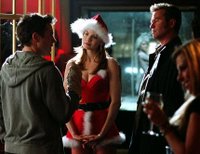 Kiss Kiss Bang Bang In contrast to Ice Harvest, Shane Black's directorial debut (he penned the Lethal Weapon films) is nominally a comedy film noir but brims over with energy. Yes, it’s overwritten, there’s too much narration and it tries too hard to be clever, and many a film student will overreach trying to write a screenplay that apes it style. But the fact remains that for all its excesses, it is funny, clever, inventive, and constantly entertaining. It’s wonderful to see Robert Downey Jr. well cast in a good role again. Val Kilmer is funny, and Michelle Monaghan flashes memorable sass and wit in addition to the obligatory sexiness (she’ll be introduced to a wider audience with Mission Impossible: III). Part of the set-up follows Downey as a small-time hood who runs from an abortive theft when his partner is shot. Panicked, he runs right into a casting session, and winds up reading a scene where by chance, he’s accused of abandoning his friend to die. Downey’s character of course gives an accidentally emotionally riveting performance, and suddenly becomes thrust into a world of Hollywood parties and intrigue. There’s much, much more, but come on, that’s a pretty damn funny set-up, and the film is full of off-beat and engaging scenes. It’s worth a look.
Kiss Kiss Bang Bang In contrast to Ice Harvest, Shane Black's directorial debut (he penned the Lethal Weapon films) is nominally a comedy film noir but brims over with energy. Yes, it’s overwritten, there’s too much narration and it tries too hard to be clever, and many a film student will overreach trying to write a screenplay that apes it style. But the fact remains that for all its excesses, it is funny, clever, inventive, and constantly entertaining. It’s wonderful to see Robert Downey Jr. well cast in a good role again. Val Kilmer is funny, and Michelle Monaghan flashes memorable sass and wit in addition to the obligatory sexiness (she’ll be introduced to a wider audience with Mission Impossible: III). Part of the set-up follows Downey as a small-time hood who runs from an abortive theft when his partner is shot. Panicked, he runs right into a casting session, and winds up reading a scene where by chance, he’s accused of abandoning his friend to die. Downey’s character of course gives an accidentally emotionally riveting performance, and suddenly becomes thrust into a world of Hollywood parties and intrigue. There’s much, much more, but come on, that’s a pretty damn funny set-up, and the film is full of off-beat and engaging scenes. It’s worth a look. Harry Potter and The Goblet of Fire Whether in Were-Rabbit or in a Harry Potter film, Ralph Fiennes plays a good villain. His appearance here yet again demonstrates the astonishingly good casting of the series. While hardcore fans of the books may lament the unavoidable excisions (sorry, even though they said they might consider 2 parts, I doubt it would happen), the film manages to capture almost all of the key elements. At this point, the franchise wisely decides you either know most of the back story, or you don’t. The dragon fight and flight sequence is viscerally exciting, even if it does make one wonder, jeez, at what point do these adult witches and wizards intervene in the name of child safety? The familiar adolescent rites of passage of first formal dates and such could easily become tiresome, but we like Harry and Ron, and they outpace the standard clichés of endearing awkwardness by being really, really awful dates. The final faceoff with the serpentine Voldemort hits the right chilling tone, as does Harry’s teleported return and Dumbledore’s final speech. Not bad for the latest entry in a series that started off too by the book to properly embody the book.
Harry Potter and The Goblet of Fire Whether in Were-Rabbit or in a Harry Potter film, Ralph Fiennes plays a good villain. His appearance here yet again demonstrates the astonishingly good casting of the series. While hardcore fans of the books may lament the unavoidable excisions (sorry, even though they said they might consider 2 parts, I doubt it would happen), the film manages to capture almost all of the key elements. At this point, the franchise wisely decides you either know most of the back story, or you don’t. The dragon fight and flight sequence is viscerally exciting, even if it does make one wonder, jeez, at what point do these adult witches and wizards intervene in the name of child safety? The familiar adolescent rites of passage of first formal dates and such could easily become tiresome, but we like Harry and Ron, and they outpace the standard clichés of endearing awkwardness by being really, really awful dates. The final faceoff with the serpentine Voldemort hits the right chilling tone, as does Harry’s teleported return and Dumbledore’s final speech. Not bad for the latest entry in a series that started off too by the book to properly embody the book. 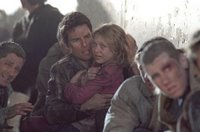 War of the Worlds There are no cuddly aliens in this one! Nearly everyone I've spoken to decries the ending, not really even Morgan Freeman as the Voice of God but the reunion. It didn't bother me that much, but there's no denying that the ending as a whole is low-key and anticlimactic compared to the rest of the film. But the film that precedes it is pretty impressive. War of the Worlds had a gutsy teaser trailer the summer before: people in a suburban neighborhood drifting out at dusk to look at the flashing lights and hear the alien sounds on the horizon. It then flashed "War of the Worlds," "Cruise," "Spielberg," "Summer 2005." It was all about anticipation and understatement, however egotistically – you either wanted to see it or you didn’t, but chances are you did. I've always thought Cruise was a bit of a cocky prick, and he delivers one of his better performances as just that, Ray, a lousy father that must grow up rapidly to save his family. It's frankly refreshing to have a major “star” play an unlikable character. Dakota Fanning continues to be one of the most impressive child actors ever. Spielberg, as he always does in his best movies, has a great eye for spectacle, but keeps his key focus on the human drama at its core. Here, while we have a cataclysmic world event that visually evokes 9/11 (the dust), Spielberg makes it all real by focusing on one family. Case in point: Harlan (Tim Robbins) is creepy (a little over the top for me) but his confrontations with Ray make the central conflict, and the casualties of the war, very human again. While I questioned many aspects of War of the Worlds hours later, they did not give me much pause while watching the film. To my mind, Spielberg is the closest current equivalent to Hitchcock we have, in the sense that he is constantly aware of, and guiding, an audience's expectations. Watch the film again and marvel at what he chooses to reveal when. After hiding in Harlan's cellar gives Ray and his daughter a breather, Ray notices the weird red stuff by the bars on the window right as we do. He investigates as we would do, touching it and wondering, as we do, what the hell it is. Then he spots an alien tripod stalking a human and we get to see what that red stuff is, in a tastefully shot but terrifying sequence. Harlan and Ray recoil in mutual horror. The film ramps up to a quieter but more intense notch right then. Spielberg once said something like, "I just sort of know where the camera should go," and boy, does he. When a few scenes later, Ray has to run outside after his daughter, Spielberg lingers on a wide shot of the red landscape that stops us as cold as it does Ray. So – my take in a nutshell – War of the Worlds is a potboiler, but similar to watching Scorsese and DeNiro strut their stuff in Cape Fear, it's a pleasure to watch such skill at work.
War of the Worlds There are no cuddly aliens in this one! Nearly everyone I've spoken to decries the ending, not really even Morgan Freeman as the Voice of God but the reunion. It didn't bother me that much, but there's no denying that the ending as a whole is low-key and anticlimactic compared to the rest of the film. But the film that precedes it is pretty impressive. War of the Worlds had a gutsy teaser trailer the summer before: people in a suburban neighborhood drifting out at dusk to look at the flashing lights and hear the alien sounds on the horizon. It then flashed "War of the Worlds," "Cruise," "Spielberg," "Summer 2005." It was all about anticipation and understatement, however egotistically – you either wanted to see it or you didn’t, but chances are you did. I've always thought Cruise was a bit of a cocky prick, and he delivers one of his better performances as just that, Ray, a lousy father that must grow up rapidly to save his family. It's frankly refreshing to have a major “star” play an unlikable character. Dakota Fanning continues to be one of the most impressive child actors ever. Spielberg, as he always does in his best movies, has a great eye for spectacle, but keeps his key focus on the human drama at its core. Here, while we have a cataclysmic world event that visually evokes 9/11 (the dust), Spielberg makes it all real by focusing on one family. Case in point: Harlan (Tim Robbins) is creepy (a little over the top for me) but his confrontations with Ray make the central conflict, and the casualties of the war, very human again. While I questioned many aspects of War of the Worlds hours later, they did not give me much pause while watching the film. To my mind, Spielberg is the closest current equivalent to Hitchcock we have, in the sense that he is constantly aware of, and guiding, an audience's expectations. Watch the film again and marvel at what he chooses to reveal when. After hiding in Harlan's cellar gives Ray and his daughter a breather, Ray notices the weird red stuff by the bars on the window right as we do. He investigates as we would do, touching it and wondering, as we do, what the hell it is. Then he spots an alien tripod stalking a human and we get to see what that red stuff is, in a tastefully shot but terrifying sequence. Harlan and Ray recoil in mutual horror. The film ramps up to a quieter but more intense notch right then. Spielberg once said something like, "I just sort of know where the camera should go," and boy, does he. When a few scenes later, Ray has to run outside after his daughter, Spielberg lingers on a wide shot of the red landscape that stops us as cold as it does Ray. So – my take in a nutshell – War of the Worlds is a potboiler, but similar to watching Scorsese and DeNiro strut their stuff in Cape Fear, it's a pleasure to watch such skill at work.  Munich Amazingly, Spielberg has several times delivered two films a year, typically one pulpy and one more serious, as with Jurassic Park and Schindler's List, Minority Report and Catch Me If You Can, and now War of the Worlds and Munich. I can never fault any film for trying to explore the effects on one's soul of killing another human being, which is the essential theme of Munich, along with an examination of the cycle of revenge. "Every civilization finds it necessary to negotiate compromises with its own values," reflects Israeli Prime Minister Golda Meir (Lynn Cohen). It was inevitable that Spielberg would garner criticism for Munich, regardless of how he made it. What perpetually confounds the stupidest of both professional and amateur critics is the fact that art can say more than one thing at a time, or, as Tom Stoppard once put, "dialogue is the only acceptable way I know of contradicting myself in public." Those persons who perpetrated the Munich massacre can be both human and deserve to die. Some critics of the film Max objected to Hitler being shown as human – well, he was human, and one of the most evil men to walk the planet as well. Humani nil a me alienum puto: Nothing human is alien to me (ironic considering Spielberg’s other film this year!). To understand is not to excuse. I dislike the idea that Spielberg must speak for all Jewish people everywhere, or offer the definitive moral lesson on how to approach terrorism. I found Munich to be an engaging, thoughtful film, even though I would have liked more insight into Eric Bana as Avner, a Mossad officer, and to have heard more moral certainty from Steve (Daniel Craig), since by most accounts members of the Mossad would not fret about such retribution killings at all. Although some writers criticized it, I greatly appreciated the scene between Avner and an Arab later in the film as they discuss politics. And, as usual, while Spielberg excels at suspense, he also throws in some nice small touches. When the men kill a woman in retribution for her murder of one of their team, one man covers the woman naked lower torso up, but another yanks the woman’s nightgown back, a final humiliation for her after death to found that way, and with the implication that she was a whore in more ways than one. A few scenes later, the man voices regret for his decision. Despite all the other murders he’s committed, it’s this small petty act that bothers him... perhaps because for once, cruelty entered into the equation. It’s a very telling, true little touch. For me, Munich raises worthy questions. It does not need to answer all of them, and it would be insultingly simplistic if it tried to. (Roger Ebert describes a phone conversation with Spielberg on Munich
Munich Amazingly, Spielberg has several times delivered two films a year, typically one pulpy and one more serious, as with Jurassic Park and Schindler's List, Minority Report and Catch Me If You Can, and now War of the Worlds and Munich. I can never fault any film for trying to explore the effects on one's soul of killing another human being, which is the essential theme of Munich, along with an examination of the cycle of revenge. "Every civilization finds it necessary to negotiate compromises with its own values," reflects Israeli Prime Minister Golda Meir (Lynn Cohen). It was inevitable that Spielberg would garner criticism for Munich, regardless of how he made it. What perpetually confounds the stupidest of both professional and amateur critics is the fact that art can say more than one thing at a time, or, as Tom Stoppard once put, "dialogue is the only acceptable way I know of contradicting myself in public." Those persons who perpetrated the Munich massacre can be both human and deserve to die. Some critics of the film Max objected to Hitler being shown as human – well, he was human, and one of the most evil men to walk the planet as well. Humani nil a me alienum puto: Nothing human is alien to me (ironic considering Spielberg’s other film this year!). To understand is not to excuse. I dislike the idea that Spielberg must speak for all Jewish people everywhere, or offer the definitive moral lesson on how to approach terrorism. I found Munich to be an engaging, thoughtful film, even though I would have liked more insight into Eric Bana as Avner, a Mossad officer, and to have heard more moral certainty from Steve (Daniel Craig), since by most accounts members of the Mossad would not fret about such retribution killings at all. Although some writers criticized it, I greatly appreciated the scene between Avner and an Arab later in the film as they discuss politics. And, as usual, while Spielberg excels at suspense, he also throws in some nice small touches. When the men kill a woman in retribution for her murder of one of their team, one man covers the woman naked lower torso up, but another yanks the woman’s nightgown back, a final humiliation for her after death to found that way, and with the implication that she was a whore in more ways than one. A few scenes later, the man voices regret for his decision. Despite all the other murders he’s committed, it’s this small petty act that bothers him... perhaps because for once, cruelty entered into the equation. It’s a very telling, true little touch. For me, Munich raises worthy questions. It does not need to answer all of them, and it would be insultingly simplistic if it tried to. (Roger Ebert describes a phone conversation with Spielberg on Munichhere. Jim Emerson takes on several Munich critics here. Spielberg read Emerson’s piece and called Ebert back here.)
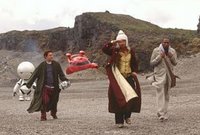 The Hitchhiker's Guide to the Galaxy When one handles a geek classic, one must be careful. This is a pretty faithful, funny adaptation of the episodic book, although it does add to/pad out part of its middle section. Most of the casting, with Martin Freeman, Zooey Deschanel, and the voice talents of Stephen Fry and Alan Rickman, is spot-on. Sam Rockwell and Mos Def aren’t bad either. While it’s too bad Douglas Adams didn’t live to see the final film, having heard the original radio show and seen the original TV series, I think Adams would be pretty pleased. For the most part, the alterations to the novel highlight already existing themes, particularly those involving the emotions of the lead characters. There’s also a great addition centered on our heroes traipsing across the homeworld of the anti-imagination Vogons. Our heroes find themselves assaulted by the very landscape, in a scene one critic described as cross between the thought police of 1984 and the Three Stooges. It’s truly inspired, worthy of the best of Adams or Monty Python.
The Hitchhiker's Guide to the Galaxy When one handles a geek classic, one must be careful. This is a pretty faithful, funny adaptation of the episodic book, although it does add to/pad out part of its middle section. Most of the casting, with Martin Freeman, Zooey Deschanel, and the voice talents of Stephen Fry and Alan Rickman, is spot-on. Sam Rockwell and Mos Def aren’t bad either. While it’s too bad Douglas Adams didn’t live to see the final film, having heard the original radio show and seen the original TV series, I think Adams would be pretty pleased. For the most part, the alterations to the novel highlight already existing themes, particularly those involving the emotions of the lead characters. There’s also a great addition centered on our heroes traipsing across the homeworld of the anti-imagination Vogons. Our heroes find themselves assaulted by the very landscape, in a scene one critic described as cross between the thought police of 1984 and the Three Stooges. It’s truly inspired, worthy of the best of Adams or Monty Python. 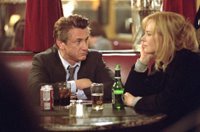 The Interpreter Sydney Pollack can typically be counted on to deliver a solid if unexceptional film. The Interpreter fizzles out a bit near the end as the plot gets more fantastical and suspension of disbelief just can’t hold for me. Before then, I found the film anchored by strong, very believable performances by Sean Penn, Nicole Kidman and Catherine Keener. Perhaps Pollack can produce a straight drama next time; he’s clearly got a good feel for it. While he can craft a decent thriller, it’s the more forced, seemingly requisite elements of that genre in the script that detract from the overall effect. But in Hollywood, actors often outshine the script...
The Interpreter Sydney Pollack can typically be counted on to deliver a solid if unexceptional film. The Interpreter fizzles out a bit near the end as the plot gets more fantastical and suspension of disbelief just can’t hold for me. Before then, I found the film anchored by strong, very believable performances by Sean Penn, Nicole Kidman and Catherine Keener. Perhaps Pollack can produce a straight drama next time; he’s clearly got a good feel for it. While he can craft a decent thriller, it’s the more forced, seemingly requisite elements of that genre in the script that detract from the overall effect. But in Hollywood, actors often outshine the script... 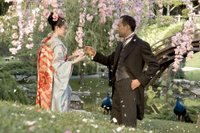 Memoirs of a Geisha Say what you like about director Rob Marshall, the man has a good eye for color and delivers a good-looking spectacle. The question remains whether he can deliver the depth and intimacy that makes for a truly engaging film. Because I had heard so many lackluster reviews of this movie, I went in with low expectations and found it better than I expected. It is a bit odd that none of the three female leads are Japanese, and although they are all fine actresses, the broken English of Ziyi Zhang and Li Gong can be hard to follow at times. The dance that forms a central plot point is also, of course, an opportunity for unabashed spectacle, but while it takes liberties with historical accuracy, it does achieve a kinetic grace.
Memoirs of a Geisha Say what you like about director Rob Marshall, the man has a good eye for color and delivers a good-looking spectacle. The question remains whether he can deliver the depth and intimacy that makes for a truly engaging film. Because I had heard so many lackluster reviews of this movie, I went in with low expectations and found it better than I expected. It is a bit odd that none of the three female leads are Japanese, and although they are all fine actresses, the broken English of Ziyi Zhang and Li Gong can be hard to follow at times. The dance that forms a central plot point is also, of course, an opportunity for unabashed spectacle, but while it takes liberties with historical accuracy, it does achieve a kinetic grace.Still, overall, the film reads as a soap opera dolled up with nice clothes and a killer photo shoot.
 As was the case with The Hours, the lines from the trailer read like lines calculated for a trailer — “You are to become — Geisha!” “I want a life that is MINE!” It’s supposed to be big and dramatic, but to me they read campy and melodramatic. I’ve liked Li Gong, Ziyi Zhang, Michelle Yeoh and Ken Watanable in other films, but here I just was not sucked in. I’m sure some college student will use the film to write a paper about what a gay Broadway choreographer’s idea of a Japanese woman’s idea of a man’s idea of a woman should be. But perhaps because my ideal woman is closer to Beatrice in Much Ado About Nothing than a geisha, Geisha the film sort of strikes me as the Japanese costume drama version of a blaxplotation film. The geisha life is glamorized, even if our heroine’s trials are bemoaned, while still other issues are completely ignored. Ken Watanabe as The Chairman is old enough to be Sayuri’s (Zhang) father, and since I find a love affair between them to be somewhat troubling, I can’t ever fully root for a Happy Ending between them. Unlike Raise the Red Lantern or even Dangerous Beauty, the sexual politics are never really addressed, which I suppose is fine, but you can’t have it both ways. If you only want to make some nice eye candy, then you don’t get to be shocked when you’re not hailed as a Serious Film. (The Washington Post interviewed a local geisha to comment on the film's accuracy, which was scattershot. My favorite line is the article's last sentence, where the geisha says "what was missing from the film... was "the tranquility of subtlety with beauty."" Hahahaha... and you would expect differently from Hollywood?)
As was the case with The Hours, the lines from the trailer read like lines calculated for a trailer — “You are to become — Geisha!” “I want a life that is MINE!” It’s supposed to be big and dramatic, but to me they read campy and melodramatic. I’ve liked Li Gong, Ziyi Zhang, Michelle Yeoh and Ken Watanable in other films, but here I just was not sucked in. I’m sure some college student will use the film to write a paper about what a gay Broadway choreographer’s idea of a Japanese woman’s idea of a man’s idea of a woman should be. But perhaps because my ideal woman is closer to Beatrice in Much Ado About Nothing than a geisha, Geisha the film sort of strikes me as the Japanese costume drama version of a blaxplotation film. The geisha life is glamorized, even if our heroine’s trials are bemoaned, while still other issues are completely ignored. Ken Watanabe as The Chairman is old enough to be Sayuri’s (Zhang) father, and since I find a love affair between them to be somewhat troubling, I can’t ever fully root for a Happy Ending between them. Unlike Raise the Red Lantern or even Dangerous Beauty, the sexual politics are never really addressed, which I suppose is fine, but you can’t have it both ways. If you only want to make some nice eye candy, then you don’t get to be shocked when you’re not hailed as a Serious Film. (The Washington Post interviewed a local geisha to comment on the film's accuracy, which was scattershot. My favorite line is the article's last sentence, where the geisha says "what was missing from the film... was "the tranquility of subtlety with beauty."" Hahahaha... and you would expect differently from Hollywood?) 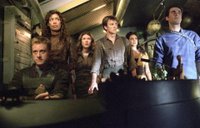 Serenity Like the Rolling Stones, Serenity is simultaneously very good at what it does and vastly overrated. It’s an entertaining film with a number of inspired, original choices, but contrary to the feelings of the Firefly fanatics, it's just not the greatest sci-fi film ever. Its greatest asset is Chiwetel Ejiofor as “the operative,” a preternaturally calm, compassionate assassin. It does manage to answer many questions and wrap up storylines from the interesting but wildly uneven TV series Firefly. I was also amused that an actress named “Summer” was playing a character named “River.” At least one character dies mainly to unnerve us for the finale; if he’s expendable, then maybe the entire crew is going down in the final battle! Still, for all the fun dialogue and off-beat scenes, writer-director Joss Whedon and the cast still seem much better suited for TV. Nathan Fillion has a nice comic feel and would be perfect for light romantic or screwball comedy. But he just doesn’t have the weight to be a badass, and when his character, Captain Mal, threatens he’ll ditch or leave his crew if they don’t go along with him, it’s utterly unconvincing. And, similar to Sin City, the “ain’t”s and “I reckons” come off as stilted, artificial and unpersuasive. Serenity is good, at times very good, and I’m very glad Whedon got a chance to make it. But I hope he realizes the flaws in his work as well, and that his true calling may be the underrated medium that is television.
Serenity Like the Rolling Stones, Serenity is simultaneously very good at what it does and vastly overrated. It’s an entertaining film with a number of inspired, original choices, but contrary to the feelings of the Firefly fanatics, it's just not the greatest sci-fi film ever. Its greatest asset is Chiwetel Ejiofor as “the operative,” a preternaturally calm, compassionate assassin. It does manage to answer many questions and wrap up storylines from the interesting but wildly uneven TV series Firefly. I was also amused that an actress named “Summer” was playing a character named “River.” At least one character dies mainly to unnerve us for the finale; if he’s expendable, then maybe the entire crew is going down in the final battle! Still, for all the fun dialogue and off-beat scenes, writer-director Joss Whedon and the cast still seem much better suited for TV. Nathan Fillion has a nice comic feel and would be perfect for light romantic or screwball comedy. But he just doesn’t have the weight to be a badass, and when his character, Captain Mal, threatens he’ll ditch or leave his crew if they don’t go along with him, it’s utterly unconvincing. And, similar to Sin City, the “ain’t”s and “I reckons” come off as stilted, artificial and unpersuasive. Serenity is good, at times very good, and I’m very glad Whedon got a chance to make it. But I hope he realizes the flaws in his work as well, and that his true calling may be the underrated medium that is television.  Two for the Money Virtually every critic, or anybody who saw the trailer, correctly pegged this film as Wall Street Lite Redux, with the industry this time being sports gambling. But this is clearly the Al Pacino show, and you go to the film wondering one thing — will he deliver the goods? Here he does. The plot gets pretty silly at times, such a ludicrous moment where the likable McConaughy “throws the script aside and speaks from the heart” with surprising dullness given that it’s supposed to be inspiring and authentic and all that. But overall, McConaughy is well cast, Rene Russo exudes an effortless grace, and Pacino delivers one of his most fun performances in recent years, perhaps most amusingly when he has the cojones to go to a Gamblers Anonymous group and essentially advertise his services.
Two for the Money Virtually every critic, or anybody who saw the trailer, correctly pegged this film as Wall Street Lite Redux, with the industry this time being sports gambling. But this is clearly the Al Pacino show, and you go to the film wondering one thing — will he deliver the goods? Here he does. The plot gets pretty silly at times, such a ludicrous moment where the likable McConaughy “throws the script aside and speaks from the heart” with surprising dullness given that it’s supposed to be inspiring and authentic and all that. But overall, McConaughy is well cast, Rene Russo exudes an effortless grace, and Pacino delivers one of his most fun performances in recent years, perhaps most amusingly when he has the cojones to go to a Gamblers Anonymous group and essentially advertise his services.  Jarhead Many critics pointed out the problems with taking Anthony Swofford's introspective, existential novel and trying to make it into a film. Jarhead also faces the Beckett-esque dilemma of how to portray boredom on screen in a way that is not boring. The cast does well and I liked Jarhead overall, but I feel it suffers from two problems. The first is the ending. While visions of Tim O'Brien's "How to Tell a True War Story" dance through my head, telling me I should know better, there's no question I found the ending of the film somewhat unsatisfying. What does our main character learn? If he got to "take the perfect shot," we could see his reaction – was it wonderful? Was it anticlimactic? Did the rest of the war, or life, become anticlimactic in contrast? Would future sniping shots still carry the same thrill, or suffer in comparison? Most narratives depend on setting up a central conflict that the hero must face, whether he or she fails or not. In Jarhead, our hero is denied this defining moment – okay, that is a touch of real life, and I would not advocate changing that from the book – but what does our hero learn from this key denial? How does he change? Jarhead's narrative demands a largely internal climax, without much of an external event, and that's a hard thing to pull off in film. The second difficulty for Jarhead is its competition. There are so many truly great and almost great war films – All Quiet on the Western Front, The Steel Helmet, The Longest Day, The Deer Hunter, Apocalypse Now, The Big Red One, Platoon, Full Metal Jacket, Saving Private Ryan, to name a handful – that Jarhead inevitably suffers a bit in comparison. It works well a slice-of-life-in-war piece, or as supplemental to one of the big boys, but it doesn't possess enough heft to supplant them.
Jarhead Many critics pointed out the problems with taking Anthony Swofford's introspective, existential novel and trying to make it into a film. Jarhead also faces the Beckett-esque dilemma of how to portray boredom on screen in a way that is not boring. The cast does well and I liked Jarhead overall, but I feel it suffers from two problems. The first is the ending. While visions of Tim O'Brien's "How to Tell a True War Story" dance through my head, telling me I should know better, there's no question I found the ending of the film somewhat unsatisfying. What does our main character learn? If he got to "take the perfect shot," we could see his reaction – was it wonderful? Was it anticlimactic? Did the rest of the war, or life, become anticlimactic in contrast? Would future sniping shots still carry the same thrill, or suffer in comparison? Most narratives depend on setting up a central conflict that the hero must face, whether he or she fails or not. In Jarhead, our hero is denied this defining moment – okay, that is a touch of real life, and I would not advocate changing that from the book – but what does our hero learn from this key denial? How does he change? Jarhead's narrative demands a largely internal climax, without much of an external event, and that's a hard thing to pull off in film. The second difficulty for Jarhead is its competition. There are so many truly great and almost great war films – All Quiet on the Western Front, The Steel Helmet, The Longest Day, The Deer Hunter, Apocalypse Now, The Big Red One, Platoon, Full Metal Jacket, Saving Private Ryan, to name a handful – that Jarhead inevitably suffers a bit in comparison. It works well a slice-of-life-in-war piece, or as supplemental to one of the big boys, but it doesn't possess enough heft to supplant them.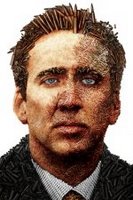 Lord of War Andrew Niccol has never been the most subtle of screenwriters or filmmakers (Gattaca, Simone), but he tends to throw some interesting character and plot touches in along the way. Lord of War is 1) essentially Blow retold with the gun trade and 2) the Nicholas Cage show. Personally, I really like Cage when he's on his game – he's got the charisma, range, energy and presence to carry a film, and here he's a lot of fun to watch. Lord of War makes its best political, educational points when it's not so damn over the top with them, as it is with the required tragic death (or two) or the opening "day in the life of a bullet" sequence… It was also funny to see the poster for Lord of Warright next to The Weather Man, with Cage wearing essentially the same disinterested-hangdog expression. (As an aside, most CGI in films is decent these days, but here it's distractingly fake, particularly a featured shot to the head… if it's to be that prominent, it needs to look better… or better still, cut away and use some fake bloody brains when you cut back, for goodness' sake.)
Lord of War Andrew Niccol has never been the most subtle of screenwriters or filmmakers (Gattaca, Simone), but he tends to throw some interesting character and plot touches in along the way. Lord of War is 1) essentially Blow retold with the gun trade and 2) the Nicholas Cage show. Personally, I really like Cage when he's on his game – he's got the charisma, range, energy and presence to carry a film, and here he's a lot of fun to watch. Lord of War makes its best political, educational points when it's not so damn over the top with them, as it is with the required tragic death (or two) or the opening "day in the life of a bullet" sequence… It was also funny to see the poster for Lord of Warright next to The Weather Man, with Cage wearing essentially the same disinterested-hangdog expression. (As an aside, most CGI in films is decent these days, but here it's distractingly fake, particularly a featured shot to the head… if it's to be that prominent, it needs to look better… or better still, cut away and use some fake bloody brains when you cut back, for goodness' sake.)  The Weather Man Normally when a film's release is delayed several times, it's a sign that it's baaad. In this case, it seems they just didn't know how to market it. The Weather Man is a "small" film, but with big stars, and winds up being a pretty compelling tale of a divorced weather man in limbo, played by Cage. Set in Chicago, it’s a beautifully shot film, with the weather appropriately becoming a minor character in its own right. His father becomes ill, he gets a great job offer in New York City, but if he takes it, it’ll damage his already uneven relationship with his two kids. He must mature, or persevere, or fail, or... do something. Director Gore Verbinski is better known for his horror and action films (The Ring, Pirates of the Caribbean), but all the performances here are solid. It’d be nice if Hollywood made more films like this... an off-beat character study with some unpredictable turns.
The Weather Man Normally when a film's release is delayed several times, it's a sign that it's baaad. In this case, it seems they just didn't know how to market it. The Weather Man is a "small" film, but with big stars, and winds up being a pretty compelling tale of a divorced weather man in limbo, played by Cage. Set in Chicago, it’s a beautifully shot film, with the weather appropriately becoming a minor character in its own right. His father becomes ill, he gets a great job offer in New York City, but if he takes it, it’ll damage his already uneven relationship with his two kids. He must mature, or persevere, or fail, or... do something. Director Gore Verbinski is better known for his horror and action films (The Ring, Pirates of the Caribbean), but all the performances here are solid. It’d be nice if Hollywood made more films like this... an off-beat character study with some unpredictable turns.  The Chronicles of Narnia: The Lion, The Witch and the Wardrobe I haven’t read the books since I was 8 or 9, but to my memory, this film seemed pretty faithful. Certainly anyone who suffered through the crudely-animated version or the low-budget live-action BBC adaptation will appreciate this definitive take on C.S. Lewis’ children’s classic. While The Lord of the Rings is more my speed, the production design and effects wizards of WETA show they can create credible fantasy realms of more than one flavor. The Christian underpinnings of the tale are impossible to ignore as an adult, not that this really matters that much. After all, a resurrection motif is common enough in myths and fairy tales, and transformation is the key theme of the story, most notably for Edmund (Skander Keynes). What anchors this film, though, is a precise, wonderful performance by Tilda Swinton as the White Witch, good voice work from Liam Neeson as Aslan, and an absolutely beguiling performance by young Georgie Henley as Lucy. Henley’s frowns convey the import of certain scenes while her smile lights up the screen. She believes in the magic of Narnia, and thus makes us believe, too.
The Chronicles of Narnia: The Lion, The Witch and the Wardrobe I haven’t read the books since I was 8 or 9, but to my memory, this film seemed pretty faithful. Certainly anyone who suffered through the crudely-animated version or the low-budget live-action BBC adaptation will appreciate this definitive take on C.S. Lewis’ children’s classic. While The Lord of the Rings is more my speed, the production design and effects wizards of WETA show they can create credible fantasy realms of more than one flavor. The Christian underpinnings of the tale are impossible to ignore as an adult, not that this really matters that much. After all, a resurrection motif is common enough in myths and fairy tales, and transformation is the key theme of the story, most notably for Edmund (Skander Keynes). What anchors this film, though, is a precise, wonderful performance by Tilda Swinton as the White Witch, good voice work from Liam Neeson as Aslan, and an absolutely beguiling performance by young Georgie Henley as Lucy. Henley’s frowns convey the import of certain scenes while her smile lights up the screen. She believes in the magic of Narnia, and thus makes us believe, too.  The Exorcism of Emily Rose Less a horror movie than a courtroom drama, Emily Rose 's greatest strength is that it keeps a human focus. Tom Wilkerson offers yet another fine performance, Laura Linney has a nice, low-key turn as his attorney, and Jennifer Carpenter exploits her long face and large, expressive features well as the possessed Emily. The scares this film provides are of the "old-school" atmospheric variety, with more subtle use of effects.
The Exorcism of Emily Rose Less a horror movie than a courtroom drama, Emily Rose 's greatest strength is that it keeps a human focus. Tom Wilkerson offers yet another fine performance, Laura Linney has a nice, low-key turn as his attorney, and Jennifer Carpenter exploits her long face and large, expressive features well as the possessed Emily. The scares this film provides are of the "old-school" atmospheric variety, with more subtle use of effects. 
Constantine The ideal Constantine would be played by a young Gary Oldman. The comic book character’s a Brit with a hard edge, a magician who plays things very low-key, with the feel of a reluctant film noir detective. Jude Law might be able to pull it off, or Ewan MacGregor or Colin Farrell, but Oldman has the bollocks-to-ya ‘tude to flip off the Devil even if it costs him eternal damnation. In place of this, we have... Keanu Reeves. Surprisingly, he’s actually not that bad, apart from his required quota of unintentionally funny line deliveries. The transposition to L.A. doesn’t work too badly either... although foggy, damp London nights would be better. While Shia LeBeouf’s role is pretty unnecessary, most of the supporting cast is superb. Rachel Weisz is always a welcome sight, Tilda Swinton delivers an odd, captivating performance as the androgynous angel Gabriel, Djimon Honsou plays a grizzled voodoo master, and Peter Stormare plays an extremely offbeat but fantastically effective Devil. The film actually manages to slip in some of the comic’s most daring storyline, so overall, I was pleasantly surprised, since I had fairly low expectations. The extremely dark storyline and cosmology are not for all viewers (Constantine briefly visits Hell), but as Hollywood schlock goes, one could worse.
 Mr. And Mrs. Smith Mr. and Mrs. Smith is an odd but enjoyable film, overshadowed by a tabloid storyline about its stars in real life so virulent the only way you could have escaped its clutches would be to go Howard Hughes-crazy, become a hermit, live in a cave, bottle your own urine and wrap yourself in saran wrap. But I digress. Director Doug Liman (Go, The Bourne Identity) continues to show he's got a great feel for both wit and action sequences. Brad Pitt and Angelina Jolie both have charm and charisma to spare, and Vince Vaughn has a small but funny role. Like Bonnie and Clyde, Mr. and Mrs. Smith only get sexually charged by doing a gig, but the difference here is that rather than planning heists together, they're trying to kill each other. If The War of the Roses were remade with automatic weaponry and some screwball comedy dialogue, this might be the result. The script takes the battle of the sexes literally, and bragging about kills supplants sexual conquests (in what may be the funniest dialogue scene in the movie). Mr. and Mrs. Smith walks a fine line with its blend of violence, romance and comedy – okay, fine, it walks a thin tightrope over a shark-filled cage while the catwalks explode with gunfire and sexually-charged one-liners – but I thought it did it well. The violence only works because it's sanitized. Our erstwhile lovers do not seriously wound each other, and in this universe, we're pretty sure these two characters won't suffer lasting harm. When in a climatic fight they gun down scores of operatives attacking them, their foes are quite deliberately clad completely in black and faceless, so that their demises have no more weight than a video game or Road Runner cartoon. The opening scenes with a marriage therapist and their coda have perfect comic feel and timing. It's all a magician's trick, but a surprisingly fun one if you go along with it.
Mr. And Mrs. Smith Mr. and Mrs. Smith is an odd but enjoyable film, overshadowed by a tabloid storyline about its stars in real life so virulent the only way you could have escaped its clutches would be to go Howard Hughes-crazy, become a hermit, live in a cave, bottle your own urine and wrap yourself in saran wrap. But I digress. Director Doug Liman (Go, The Bourne Identity) continues to show he's got a great feel for both wit and action sequences. Brad Pitt and Angelina Jolie both have charm and charisma to spare, and Vince Vaughn has a small but funny role. Like Bonnie and Clyde, Mr. and Mrs. Smith only get sexually charged by doing a gig, but the difference here is that rather than planning heists together, they're trying to kill each other. If The War of the Roses were remade with automatic weaponry and some screwball comedy dialogue, this might be the result. The script takes the battle of the sexes literally, and bragging about kills supplants sexual conquests (in what may be the funniest dialogue scene in the movie). Mr. and Mrs. Smith walks a fine line with its blend of violence, romance and comedy – okay, fine, it walks a thin tightrope over a shark-filled cage while the catwalks explode with gunfire and sexually-charged one-liners – but I thought it did it well. The violence only works because it's sanitized. Our erstwhile lovers do not seriously wound each other, and in this universe, we're pretty sure these two characters won't suffer lasting harm. When in a climatic fight they gun down scores of operatives attacking them, their foes are quite deliberately clad completely in black and faceless, so that their demises have no more weight than a video game or Road Runner cartoon. The opening scenes with a marriage therapist and their coda have perfect comic feel and timing. It's all a magician's trick, but a surprisingly fun one if you go along with it. 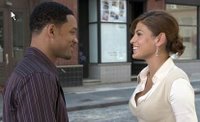
Hitch Every year, the demand for romantic comedies far exceeds the supply of good ones. Hitch rises above the pack by having a smart, funny premise, some clever scenes, and an engaging leading man in Will Smith. Eva Mendes shows once again she has a nice comic touch, something an actress of her bold, model features doesn't always get to demonstrate. And while I'm no fan of Kevin James normally, he creates some good physical humor and plays a decent enough schlub, even if the film does continue the sitcom tradition of dumpy guy and far more attractive gal. Like many a romantic comedy, though, Hitch suffers most from the obligatory "boy loses girl" section of the movie, which true to form feels a bit forced and goes on too long. Still, you could do far worse than this one.
(Hitch also commits a serious error by naming its villain Vance Munson. First of all, we all know Norwegians are the good guys, and what self-respecting Viking would name their child "Vance?" Second of all, instead of crafty, cruel, sexual deception, Scandinavians instead favor upfront pillaging, writing moody psychological dramas, or creating low-cost, high-quality health care. Scandinavians don't love and leave their paramours without a five-hour miniseries starring Liv Ullman first. Dear Will Smith: I expect better product from a man of your caliber, sir.)
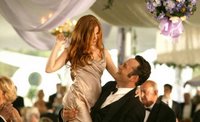 Wedding Crashers While Wedding Crashers was not the best overall comedy of the year in my book, its best sequences did make me laugh harder than any other film. As with Hitch, Wedding Crashers starts with a great premise and loses some steam during its obligatory "boy loses girl" section, redeemed somewhat by the goofy appearance of Will Ferrell as a demented mentor. The real joy of this film is the interplay between Vince Vaughn and Owen Wilson, with Vaughn being about the funniest he's ever been. The opening marriage counseling scene is painfully funny, as is a later breakfast scene between the two of them. Rachel McAdams makes a slightly offbeat object of affection for Wilson, while Isla Fisher plays a downright loon, essentially stalking Vaughn. The film jumps the rails for me a bit at two points. The first is when we're introduced to the larger, impossibly eccentric family. While the tormented gay artistic son and bigoted grandmother provide some cheap laughs, and the family as a whole provides some genuinely funny scenes (the hand-in-lap dinner), the rules of this comic world now change, and I can longer even pretend we're in reality. Someone has to be the straight man; the Marx Brothers had to run wild in a world of Margaret Dumonts. The point where I really say, “please, God, no" was the "stop the wedding so I can protest my love!" "Do what I say, woman!" scene. Bradley Cooper's character "Sack" is such an over-the-top ass, it becomes impossible to believe any woman, certainly one as supposedly sharp as McAdams' Claire, would stay with him for more than a single incident. Sure, it's a movie, but if you want to try to play our heartstrings with the downer section and suddenly have us take all this crap seriously, then we need to buy it on some level, guys. At least Owen Wilson mopes comically. (The only "we only use 10 percent of our hearts" line was penned by Wilson, by the way… and the fact that the studio wanted to nix the hand-in-the-lap dinner sequence shows that studio execs are particularly deadly when it comes to killing comedy. You can hear screenwriters Steve Faber and Bob Fisher on The Treatment here.)
Wedding Crashers While Wedding Crashers was not the best overall comedy of the year in my book, its best sequences did make me laugh harder than any other film. As with Hitch, Wedding Crashers starts with a great premise and loses some steam during its obligatory "boy loses girl" section, redeemed somewhat by the goofy appearance of Will Ferrell as a demented mentor. The real joy of this film is the interplay between Vince Vaughn and Owen Wilson, with Vaughn being about the funniest he's ever been. The opening marriage counseling scene is painfully funny, as is a later breakfast scene between the two of them. Rachel McAdams makes a slightly offbeat object of affection for Wilson, while Isla Fisher plays a downright loon, essentially stalking Vaughn. The film jumps the rails for me a bit at two points. The first is when we're introduced to the larger, impossibly eccentric family. While the tormented gay artistic son and bigoted grandmother provide some cheap laughs, and the family as a whole provides some genuinely funny scenes (the hand-in-lap dinner), the rules of this comic world now change, and I can longer even pretend we're in reality. Someone has to be the straight man; the Marx Brothers had to run wild in a world of Margaret Dumonts. The point where I really say, “please, God, no" was the "stop the wedding so I can protest my love!" "Do what I say, woman!" scene. Bradley Cooper's character "Sack" is such an over-the-top ass, it becomes impossible to believe any woman, certainly one as supposedly sharp as McAdams' Claire, would stay with him for more than a single incident. Sure, it's a movie, but if you want to try to play our heartstrings with the downer section and suddenly have us take all this crap seriously, then we need to buy it on some level, guys. At least Owen Wilson mopes comically. (The only "we only use 10 percent of our hearts" line was penned by Wilson, by the way… and the fact that the studio wanted to nix the hand-in-the-lap dinner sequence shows that studio execs are particularly deadly when it comes to killing comedy. You can hear screenwriters Steve Faber and Bob Fisher on The Treatment here.)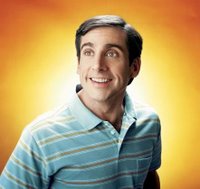 The 40-Year Old Virgin As Conan O'Brien remarked about the poster, "He looks so hopeful!" I found this the best comedy of the year. Rather than merely mocking Andy (Steve Carrell), the filmmakers really make him a character you root for, and laugh with versus solely at. You may mock him, but you also become invested in having things work out for him. This sums up Andy's buddies in a nutshell, since they both tease and encourage Andy. But while they seem to have their acts together at first, they turn out to be deeply flawed as well… No one in the film is bad, just silly or confused. Catherine Keener grounds the film nicely, Kat Dennings feels real as her daughter, and Elizabeth Banks has a sexy turn in small, nutty role. As Andy dodges a few crazies, it becomes apparent that, prevailing social pressures aside, perhaps getting laid at any cost is not worth it, and the quality of the relationship may actually matter. Oh, and the very end is inspired and hilarious.
The 40-Year Old Virgin As Conan O'Brien remarked about the poster, "He looks so hopeful!" I found this the best comedy of the year. Rather than merely mocking Andy (Steve Carrell), the filmmakers really make him a character you root for, and laugh with versus solely at. You may mock him, but you also become invested in having things work out for him. This sums up Andy's buddies in a nutshell, since they both tease and encourage Andy. But while they seem to have their acts together at first, they turn out to be deeply flawed as well… No one in the film is bad, just silly or confused. Catherine Keener grounds the film nicely, Kat Dennings feels real as her daughter, and Elizabeth Banks has a sexy turn in small, nutty role. As Andy dodges a few crazies, it becomes apparent that, prevailing social pressures aside, perhaps getting laid at any cost is not worth it, and the quality of the relationship may actually matter. Oh, and the very end is inspired and hilarious.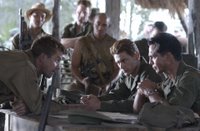 The Great Raid John Dahl, a director who elicits strong performances and has a great feel for the reaction shot (Last Seduction, Rounders), here recreates an astonishingly successful raid by U.S. Army Rangers to rescue P.O.W.s from the Japanese during WWII. Many a critic has noted how the film is an old-school throwback where the unit is the hero versus some central character. It's pretty straightforward, meat-and potatoes filmmaking, but effective for all that, even a nice change of pace. The subplot with (the very tall) Connie Nielsen portraying Margaret Utinsky feels a bit tacked on, an attempt to involve a woman in the cast and create a love story. Still, I couldn't complain too much, since it's a pleasure to watch her determined nurse working with the resistance. Joseph Fiennes' character is apparently invented, and thus his romance with Nielsen is as well, but rather than being distracting, it just gives a little extra urgency to the rescue. Apparently, the raid itself is very accurately portrayed, and the detailed planning that proceeds it is compelling in a low-key way. This is a war film where brains, coordinated teamwork, and the humility to adapt and change one's plans yields success, versus some solitary, macho act of bravado. Following the tradition of The Seven Samurai and The Dirty Dozen, The Great Raid wisely lays out for us exactly what is supposed to happen… and then lets us see how it plays out.
The Great Raid John Dahl, a director who elicits strong performances and has a great feel for the reaction shot (Last Seduction, Rounders), here recreates an astonishingly successful raid by U.S. Army Rangers to rescue P.O.W.s from the Japanese during WWII. Many a critic has noted how the film is an old-school throwback where the unit is the hero versus some central character. It's pretty straightforward, meat-and potatoes filmmaking, but effective for all that, even a nice change of pace. The subplot with (the very tall) Connie Nielsen portraying Margaret Utinsky feels a bit tacked on, an attempt to involve a woman in the cast and create a love story. Still, I couldn't complain too much, since it's a pleasure to watch her determined nurse working with the resistance. Joseph Fiennes' character is apparently invented, and thus his romance with Nielsen is as well, but rather than being distracting, it just gives a little extra urgency to the rescue. Apparently, the raid itself is very accurately portrayed, and the detailed planning that proceeds it is compelling in a low-key way. This is a war film where brains, coordinated teamwork, and the humility to adapt and change one's plans yields success, versus some solitary, macho act of bravado. Following the tradition of The Seven Samurai and The Dirty Dozen, The Great Raid wisely lays out for us exactly what is supposed to happen… and then lets us see how it plays out. 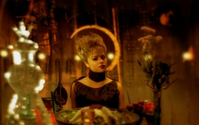 Mirrormask This is an odd little film, and its appeal may well hinge on whether or not you're a fan of the seminal comic book The Sandman by writer Neil Gaiman and cover artist Dave McKean (here serving as screenwriter and director, respectively). Helena (Stephanie Leonidas), a young circus girl not far into puberty, wishes her mother ill, and then her wish comes true. Soon after, she enters a magical world where most people mirror folks she knows in real life, but while some are kind, many are malicious doppelgangers. The Queen of Light is in an unshakeable sleep, and the kingdom is under siege from the Queen of Darkness (both queens are played by the same actress that plays Helena's mother). Helena must find the mirrormask to restore order, with the fickle clown Valentine as her chief companion. Some critics whine that the story is a ripoff of The Wizard of Oz, but that's a stupid opinion. It's more accurate to say that Oz author Frank L. Baum mined some of the same motifs, but even so, the works are radically different. Gaiman knows his fairy tales extremely well, and nearly all fairy tales feature a passage from what Joseph Campbell calls "The Ordinary World" into "The Extraordinary World." (For that matter, A Midsummer Night's Dream (not coincidentally featuring faeries) does it pretty damn well too.) Credit McKean and Gaiman for creating their own unique universe, and using CG effects for something other than the latest monster/disaster film. If the film succeeds in anything, it's in creating a good representation of a young teenager's dream state. If it fails in anything, it's that that dream state makes for a meandering narrative that impedes the momentum of the plot. Still, Mirrormask is more than a curio, and clearly is a film where the journey is at least as important as the destination.
Mirrormask This is an odd little film, and its appeal may well hinge on whether or not you're a fan of the seminal comic book The Sandman by writer Neil Gaiman and cover artist Dave McKean (here serving as screenwriter and director, respectively). Helena (Stephanie Leonidas), a young circus girl not far into puberty, wishes her mother ill, and then her wish comes true. Soon after, she enters a magical world where most people mirror folks she knows in real life, but while some are kind, many are malicious doppelgangers. The Queen of Light is in an unshakeable sleep, and the kingdom is under siege from the Queen of Darkness (both queens are played by the same actress that plays Helena's mother). Helena must find the mirrormask to restore order, with the fickle clown Valentine as her chief companion. Some critics whine that the story is a ripoff of The Wizard of Oz, but that's a stupid opinion. It's more accurate to say that Oz author Frank L. Baum mined some of the same motifs, but even so, the works are radically different. Gaiman knows his fairy tales extremely well, and nearly all fairy tales feature a passage from what Joseph Campbell calls "The Ordinary World" into "The Extraordinary World." (For that matter, A Midsummer Night's Dream (not coincidentally featuring faeries) does it pretty damn well too.) Credit McKean and Gaiman for creating their own unique universe, and using CG effects for something other than the latest monster/disaster film. If the film succeeds in anything, it's in creating a good representation of a young teenager's dream state. If it fails in anything, it's that that dream state makes for a meandering narrative that impedes the momentum of the plot. Still, Mirrormask is more than a curio, and clearly is a film where the journey is at least as important as the destination.  Enron: The Smartest Guys in the Room Much of this material is not new to anyone who's read Pipe Dreams, Conspiracy of Fools, or, well, Enron: The Smartest Guys in the Room. The Enron scandal is so large and labyrinthine, with so many players, this commendable doc cannot possibly cover everything. It also suffers from the fact the trial is now underway and the results are still pending, giving one a feeling of, couldn't you guys have waited just one more year or two? Still, the filmmakers do a good job of painting Enron’s culture, of capturing Skilling's personality, and they unearth some great internal footage. By far the most damning and stellar section, though, is the one on California. While I had read about Enron’s California energy scam, I hadn't moved to the state yet at the time, and so didn't have firsthand experience of the horrible, unethical, and what should be criminal actions of Enron gouging the state. (And let's not forget the unconscionable wankers in Congress who pointed to the Enron-California deregulation debacle as proof the country needed to further deregulate energy!) The filmmakers play audio of Enron traders talking with the heads of power plants, arranging artificial blackouts and brownouts to drive up prices. Forget inconvenience, how many people died as a result? Anyone who watches this film and still thinks corporations can be trusted to always act in the public interest needs to either down some serious Prozac or join the current administration.
Enron: The Smartest Guys in the Room Much of this material is not new to anyone who's read Pipe Dreams, Conspiracy of Fools, or, well, Enron: The Smartest Guys in the Room. The Enron scandal is so large and labyrinthine, with so many players, this commendable doc cannot possibly cover everything. It also suffers from the fact the trial is now underway and the results are still pending, giving one a feeling of, couldn't you guys have waited just one more year or two? Still, the filmmakers do a good job of painting Enron’s culture, of capturing Skilling's personality, and they unearth some great internal footage. By far the most damning and stellar section, though, is the one on California. While I had read about Enron’s California energy scam, I hadn't moved to the state yet at the time, and so didn't have firsthand experience of the horrible, unethical, and what should be criminal actions of Enron gouging the state. (And let's not forget the unconscionable wankers in Congress who pointed to the Enron-California deregulation debacle as proof the country needed to further deregulate energy!) The filmmakers play audio of Enron traders talking with the heads of power plants, arranging artificial blackouts and brownouts to drive up prices. Forget inconvenience, how many people died as a result? Anyone who watches this film and still thinks corporations can be trusted to always act in the public interest needs to either down some serious Prozac or join the current administration. 
The Aristocrats Actually, this may be the film that made me laugh the most last year. While I wanted to like it more than I did, and was frustrated that we didn't actually hear the title joke more often – why no Robin Williams' telling of it? – this is a great documentary for anyone who's studied, or appreciates, the history of stand-up comedy or comedy in general. I've long been a fan of Sarah Silverman, who brilliantly tells the titular joke from the point-of-view of a victim, only now processing what happened to her. Other highlights are a mime version of the joke, Andy Richter telling it to his infant son, plus stabs at it from George Carlin, Gilbert Gottfried, and Bob Saget (long one of the bluest comedians ever, despite his squeaky-clean Full House image). Doing a doc about comedy can be a real tightrope act, because too much dissection without enough fun just kills the whole thing. This would be a horrible first date movie, but a superb later date movie, in the sense that what makes someone laugh is very revealing. (You can hear directors Penn Jillette and Paul Provenza on The Treatment here.
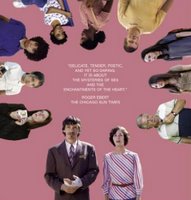 Me and You and Everyone We Know Touted as 2005's Sideways, this quirky indie from writer-director-star Miranda July has several memorable scenes, but lacks the character depth and poignancy of that earlier film. Me… loosely connects a group of characters all looking for some sort of intimacy, sexual or otherwise. The funniest scene in the movie involves a young boy's bizarre and hilarious idea of what a physically intimate moment may be, as featured in an anonymous online chat. I know several people who were unnerved by many of the scenes in the movie, and I don't blame them. Certain incidents are funny but not disturbing only because they turn out all right. As it is, the kids are alternately wise and reckless in this film, and the adults are fumbling but mostly harmless. While it's not the sleeper find of the year, since there's absolutely no one of note in the film, it is a true indie, and it works as a quirky, offbeat comedy-romance. (You can hear Miranda July on The Treatment here.)
Me and You and Everyone We Know Touted as 2005's Sideways, this quirky indie from writer-director-star Miranda July has several memorable scenes, but lacks the character depth and poignancy of that earlier film. Me… loosely connects a group of characters all looking for some sort of intimacy, sexual or otherwise. The funniest scene in the movie involves a young boy's bizarre and hilarious idea of what a physically intimate moment may be, as featured in an anonymous online chat. I know several people who were unnerved by many of the scenes in the movie, and I don't blame them. Certain incidents are funny but not disturbing only because they turn out all right. As it is, the kids are alternately wise and reckless in this film, and the adults are fumbling but mostly harmless. While it's not the sleeper find of the year, since there's absolutely no one of note in the film, it is a true indie, and it works as a quirky, offbeat comedy-romance. (You can hear Miranda July on The Treatment here.)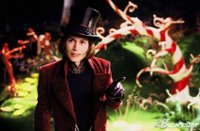 Charlie and the Chocolate Factory These days, one cannot stop the trend of remakes. All one can do is hope that the team hired for the remake is a good one. In the case of Charlie and the Chocolate Factory, it seems at first glance that Tim Burton and Johnny Depp are great choices. Furthermore, it's not truly a remake, since both it and the earlier Willy Wonka and the Chocolate Factory are based on a book, and Charlie... winds up being much more faithful to it. That being said, while I tried to like this film, I just didn't. As Charlie, Freddie Highmore is as winning as he was in Finding Neverland. But Johnny Depp, normally a fine actor, gives a mannered, self-indulgent, and off-putting performance. Whatever the faults of the earlier film, Gene Wilder had a sense of magic and charm, while Depp, with his pale skin, pageboy haircut and self-consciously eccentric demeanor instead evokes two truly scary figures, Michael Jackson and Judith Miller. The big musical numbers with Deep Roy are inventively staged, but almost pointless, as Danny Elfman's overly produced approach almost completely obscures the lyrics drawn directly from Dahl's book. While many Burton fans naturally like Christopher Lee, the whole childhood exposition with Wonka is completely unnecessary and detracts from the story (bad, bad studio story conference people!). Roald Dahl wrote many a horror story, and several tales for Alfred Hitchcock Presents. Although Charlie… and other Dahl books have become classics, they possess a surprisingly dark streak for children's lit, and Burton should be perfect for it all – if only he kept his eye on the magic of the books as well. Burton always delivers a good looking product, but his films don't always have a coherent, compelling story, nor a soul. His best to date remain Edward Scissorhands and Ed Wood because of their greater emotional depth. I hoping his next film (hmm… Ed Batman?) will equal his better efforts.
Charlie and the Chocolate Factory These days, one cannot stop the trend of remakes. All one can do is hope that the team hired for the remake is a good one. In the case of Charlie and the Chocolate Factory, it seems at first glance that Tim Burton and Johnny Depp are great choices. Furthermore, it's not truly a remake, since both it and the earlier Willy Wonka and the Chocolate Factory are based on a book, and Charlie... winds up being much more faithful to it. That being said, while I tried to like this film, I just didn't. As Charlie, Freddie Highmore is as winning as he was in Finding Neverland. But Johnny Depp, normally a fine actor, gives a mannered, self-indulgent, and off-putting performance. Whatever the faults of the earlier film, Gene Wilder had a sense of magic and charm, while Depp, with his pale skin, pageboy haircut and self-consciously eccentric demeanor instead evokes two truly scary figures, Michael Jackson and Judith Miller. The big musical numbers with Deep Roy are inventively staged, but almost pointless, as Danny Elfman's overly produced approach almost completely obscures the lyrics drawn directly from Dahl's book. While many Burton fans naturally like Christopher Lee, the whole childhood exposition with Wonka is completely unnecessary and detracts from the story (bad, bad studio story conference people!). Roald Dahl wrote many a horror story, and several tales for Alfred Hitchcock Presents. Although Charlie… and other Dahl books have become classics, they possess a surprisingly dark streak for children's lit, and Burton should be perfect for it all – if only he kept his eye on the magic of the books as well. Burton always delivers a good looking product, but his films don't always have a coherent, compelling story, nor a soul. His best to date remain Edward Scissorhands and Ed Wood because of their greater emotional depth. I hoping his next film (hmm… Ed Batman?) will equal his better efforts.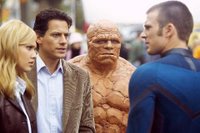 Fantastic Four I saw this film at a preview screening, and in the parking garage elevator a woman asked me and another passenger if we had seen the film and what we thought. Sensing she was a studio flack, we gave polite but subdued positive reactions, "it was all right" and such. I almost said, "well, do you really want to know?" but I sensed she didn't. I would have said this: "Batman Begins was a film for adults, and this is a film for kids. Batman Begins was for people who read graphic novels, and Fantastic Four is for people who watch Saturday morning cartoons. The film's not bad, and some sequences, such as the bridge rescue, are pretty involving, but I wouldn't go and see it again and wouldn't necessarily recommend it to my friends. But I'm not the intended demographic." Director Tim Story was a fan of the comic books, but he seems in over his head with this film. Two moments in the film are just laughable and got audible guffaws in the theater, and one isn't Story's fault but the other is. The first involves Jessica Alba being introduced as Dr. Sue Storm, an expert in… something. Alba looks like a college coed, whose only possible doctorate must have been written on the effects of push-up bras to overcome gravity and better display cleavage (not that the audience minded, but they did laugh every time she entered in a new revealing outfit). The second moment involves Ben Grimm's fiancée pushing through a crowd cheering him only to lay her engagement ring on the asphalt and then flee. In addition to the gratuitous close-ups on Grimm's pained face, it's all just so over-the-top and so out of tone with the rest of the upbeat scene (she's going to dump him without a second thought when he's suddenly a big hero?) that it invokes major snickers. While I'm glad Ioan Gruffudd and Michael Chiklis, both fine actors, got big paychecks, I have two more gripes, related to the source material. Ben Grimm is awfully easily duped. Iago's inbred retarded younger brother could snow this guy. In this case, Story should have gone beyond the shallowness of the comic (as the best comic book adaptations have). The other gripe is that Doctor Doom, one of the great comic book villains and a forerunner of Darth Vader, is made a slimy but slick yuppie business wolf, when he should be more like, well, Darth Vader, prone to making megalomaniac speeches to no one and handling his enemies with Teutonic, dictatorial panache. In this case, Story should have skewed closer to the comic. I was surprised and disappointed that a film this slight did such good box office, although Tim Story seems like a nice enough guy and this is the biggest film ever to be directed by an African-American. (While Rob Vaux always delivers a well-written review, my favorite last year was his inspired piece here on Fantastic Four, as written by Doctor Doom. You can hear director Tim Story on The Treatment here.)
Fantastic Four I saw this film at a preview screening, and in the parking garage elevator a woman asked me and another passenger if we had seen the film and what we thought. Sensing she was a studio flack, we gave polite but subdued positive reactions, "it was all right" and such. I almost said, "well, do you really want to know?" but I sensed she didn't. I would have said this: "Batman Begins was a film for adults, and this is a film for kids. Batman Begins was for people who read graphic novels, and Fantastic Four is for people who watch Saturday morning cartoons. The film's not bad, and some sequences, such as the bridge rescue, are pretty involving, but I wouldn't go and see it again and wouldn't necessarily recommend it to my friends. But I'm not the intended demographic." Director Tim Story was a fan of the comic books, but he seems in over his head with this film. Two moments in the film are just laughable and got audible guffaws in the theater, and one isn't Story's fault but the other is. The first involves Jessica Alba being introduced as Dr. Sue Storm, an expert in… something. Alba looks like a college coed, whose only possible doctorate must have been written on the effects of push-up bras to overcome gravity and better display cleavage (not that the audience minded, but they did laugh every time she entered in a new revealing outfit). The second moment involves Ben Grimm's fiancée pushing through a crowd cheering him only to lay her engagement ring on the asphalt and then flee. In addition to the gratuitous close-ups on Grimm's pained face, it's all just so over-the-top and so out of tone with the rest of the upbeat scene (she's going to dump him without a second thought when he's suddenly a big hero?) that it invokes major snickers. While I'm glad Ioan Gruffudd and Michael Chiklis, both fine actors, got big paychecks, I have two more gripes, related to the source material. Ben Grimm is awfully easily duped. Iago's inbred retarded younger brother could snow this guy. In this case, Story should have gone beyond the shallowness of the comic (as the best comic book adaptations have). The other gripe is that Doctor Doom, one of the great comic book villains and a forerunner of Darth Vader, is made a slimy but slick yuppie business wolf, when he should be more like, well, Darth Vader, prone to making megalomaniac speeches to no one and handling his enemies with Teutonic, dictatorial panache. In this case, Story should have skewed closer to the comic. I was surprised and disappointed that a film this slight did such good box office, although Tim Story seems like a nice enough guy and this is the biggest film ever to be directed by an African-American. (While Rob Vaux always delivers a well-written review, my favorite last year was his inspired piece here on Fantastic Four, as written by Doctor Doom. You can hear director Tim Story on The Treatment here.) Elizabethtown Did I mention Orlando Bloom is not a leading man? He actually does better in Kingdom of Heaven, since he’s part of a giant spectacle, but here in a character-driven piece, his deficiencies are laid bare. Dunst plays a charming, er, stalker (she’s charming if the stalkee likes her and creepy if he doesn’t), but Bloom’s cerebral, cold, and pretty stiff performance just doesn’t work. I can see him trying hard at times, and I wondered if his awkwardness sort of worked, as he returns to his father’s hometown in Tennessee just after his father unexpectedly dies. But the culture clash of big city and small town South is infinitely better handled in Junebug. Elizabethtown does offer some charming and truly funny moments (“Free Bird!”), but it is at least five films awkwardly mashed into one. One story is about a hotshot designer’s fall from grace and his fairly funny attempt at suicide, but that’s mainly just a setup. Another is the same young man coming to terms with his father’s death. A third is a burgeoning love story. So far, so good... we’ve seen this general storyline before, but if well done, it works... but now we go off the tracks. Cameron Crowe then throws in, late, a unnecessary story of Susan Sarandon as Bloom’s mother coming to terms with her husband’s death. A line or two, a scene or two would have been fine, but not a 10 minute showcase that grinds everything else to a halt. And finally, Crowe feels the need to split up his boy and girl only to get them together again by starting yet another film, a road trip, extending the whole damn thing by 20 minutes when it should be wrapping up! I give Crowe a pass on this, because his own father recently died, and I suspect the material was just too close and precious to him to edit and revise it as it clearly needed. I’m rooting for him to get back on form next time with something approaching his best film to date, Almost Famous.
Elizabethtown Did I mention Orlando Bloom is not a leading man? He actually does better in Kingdom of Heaven, since he’s part of a giant spectacle, but here in a character-driven piece, his deficiencies are laid bare. Dunst plays a charming, er, stalker (she’s charming if the stalkee likes her and creepy if he doesn’t), but Bloom’s cerebral, cold, and pretty stiff performance just doesn’t work. I can see him trying hard at times, and I wondered if his awkwardness sort of worked, as he returns to his father’s hometown in Tennessee just after his father unexpectedly dies. But the culture clash of big city and small town South is infinitely better handled in Junebug. Elizabethtown does offer some charming and truly funny moments (“Free Bird!”), but it is at least five films awkwardly mashed into one. One story is about a hotshot designer’s fall from grace and his fairly funny attempt at suicide, but that’s mainly just a setup. Another is the same young man coming to terms with his father’s death. A third is a burgeoning love story. So far, so good... we’ve seen this general storyline before, but if well done, it works... but now we go off the tracks. Cameron Crowe then throws in, late, a unnecessary story of Susan Sarandon as Bloom’s mother coming to terms with her husband’s death. A line or two, a scene or two would have been fine, but not a 10 minute showcase that grinds everything else to a halt. And finally, Crowe feels the need to split up his boy and girl only to get them together again by starting yet another film, a road trip, extending the whole damn thing by 20 minutes when it should be wrapping up! I give Crowe a pass on this, because his own father recently died, and I suspect the material was just too close and precious to him to edit and revise it as it clearly needed. I’m rooting for him to get back on form next time with something approaching his best film to date, Almost Famous.  Robert DeNiro ponders, "what the hell am I doing in this movie?"
Robert DeNiro ponders, "what the hell am I doing in this movie?" Hide and Seek Robert DeNiro is one of his generation's great actors, but in the past five years or so, he's apparently gotten desperate to get more money for his Tribeca Film Festival. How else to explain the precipitous drop in the quality of his film picks? Here, he's decent enough at first, but as the film goes into its final stretch, I just felt embarrassed for him. It's nice to see the lovely and talented Elisabeth Shue getting work again, and Dakota Fanning is an extraordinarily accomplished child actress… although here everyone says, "what a cute kid" when she's looking paler and mopier than Wednesday from the Addams Family. You don't expect much from a movie like this, only that it delivers the goods, but it jumps the rails so badly in its third act, it serves only as a cautionary tale of how not to make a Hollywood thriller. People in the theater were openly mocking it. Note to Hollywood: While ya kept us guessing for a bit, which is good, this particular "twist" is so overdone, it just doesn't work anymore 90% of the time.
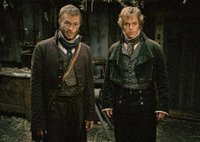
Brothers Grimm It's painful to have to write a less than glowing review for a Terry Gilliam film, just as it is for a Coen Brothers flick. In Gilliam's defense, his hands were somewhat tied… he wanted Johnny Depp for the male lead, but this was pre-Pirates. Gilliam did like Damon, though, his "second choice," and Damon apparently really took to Gilliam (they were both disappointed the studio wouldn't let Damon wear a huge facial scar). Apparently, Gilliam, Damon, and Ledger all lobbied furiously at the studio to give them the incandescent, elfin Samantha Morton but the studio insisted on Lena Headley instead. While better casting would have helped, the film is odd, dark, and sadly uninvolving. A perfect example is Peter Stormare as one of the villains, the Italian cop-torturer Cavaldi. Stomare might have had fun putting on his thick accent, but it's almost incomprehensible. There are times it feels the filmmakers had far more fun than we're having watching the final film. Meanwhile, Heath Ledger's typical mumble-understatement schtick works in Brokeback Mountain, but here it works as it usually does, as negative charisma (unless you think he's purty). Gilliam was the right choice for this material, a confrontation between the magical and the supposedly modern world, but the script needed more work, the film needs more energy and soul, and the studio needed to back the hell away. If you hire Terry Gilliam, then let him make a Terry Gilliam film, dammit! His is a mad genius, gifted with a unique and stunning visual sense, far from infallible, but one you tamper with at your peril.
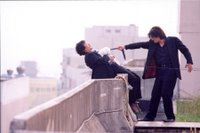 Oldboy (released in Korea in 2003) A habitual drunkard is kidnapped and kept in an odd, private prison for 15 years. Upon his release, he discovers he has new martial arts acumen, and sets out to revenge himself upon whoever imprisoned him. The result is one of the most memorable revenge tales you'll likely see, but be warned, this is not a feel-good film at all. Most likely, you'll wish you could give your brain a long, hot shower afterwards. As Rob Vaux put it, it's not necessarily good, but it is "effective." Like many a successful Asian film (most of them ghost tales-horror), this is slotted for an American remake, in this case scheduled for release later this year. I've read that Korean films, even more than other Asian films, have an obsession with cruel violence and maimings. It's not a huge surprise that Tarantino is a fan of this movie. Because the situation is striking, but unbelievable, I found myself (as with The Sixth Sense) noting some of the odd choices of the film, but letting most of them slide in the name of suspension of disbelief… but some of these are intentional clues. As it is, I figured out the "twist" (and it's a doozy) only about a minute before our erstwhile hero. This is a world where even an unintended, innocent slight can cause horrible trauma or lead to a lifetime of misery. The filmmakers deserve credit for creating a palpably bizarre world, but whether or not you want to enter in is another matter.
Oldboy (released in Korea in 2003) A habitual drunkard is kidnapped and kept in an odd, private prison for 15 years. Upon his release, he discovers he has new martial arts acumen, and sets out to revenge himself upon whoever imprisoned him. The result is one of the most memorable revenge tales you'll likely see, but be warned, this is not a feel-good film at all. Most likely, you'll wish you could give your brain a long, hot shower afterwards. As Rob Vaux put it, it's not necessarily good, but it is "effective." Like many a successful Asian film (most of them ghost tales-horror), this is slotted for an American remake, in this case scheduled for release later this year. I've read that Korean films, even more than other Asian films, have an obsession with cruel violence and maimings. It's not a huge surprise that Tarantino is a fan of this movie. Because the situation is striking, but unbelievable, I found myself (as with The Sixth Sense) noting some of the odd choices of the film, but letting most of them slide in the name of suspension of disbelief… but some of these are intentional clues. As it is, I figured out the "twist" (and it's a doozy) only about a minute before our erstwhile hero. This is a world where even an unintended, innocent slight can cause horrible trauma or lead to a lifetime of misery. The filmmakers deserve credit for creating a palpably bizarre world, but whether or not you want to enter in is another matter.  Breaking News (released in China in 2004) Breaking News sets up a power struggle between three entities: cops, robbers, and the media. In terms of content, Breaking News is not nearly as daring as it pretends to be… yeah, yeah, yeah, it's all about PR, not performance, and the authorities try to manipulate the public, just as the robbers do some of their own counterpropaganda, and the media are vultures who will turn on anyone in the name of a better storyline. Breaking News features some good scenes both dramatic and comic, but its real merits are its style, not its content. You've seen long, uninterrupted shots to open a film before, but in a cop movie with an extended gunfight? It's a cocky, bold, bravura move, and it's very impressive. With a writing group of six or more writers credited with the script, this flick is more about showing off some cool tricks than, say, telling you anything you don't already know about the media or something profound about the human condition. You'll see a very hotheaded cop, his disapproving, image-conscious superiors, and a villain who waxes philosophical — nothing groundbreaking. But some of the camerawork is truly innovative.
Breaking News (released in China in 2004) Breaking News sets up a power struggle between three entities: cops, robbers, and the media. In terms of content, Breaking News is not nearly as daring as it pretends to be… yeah, yeah, yeah, it's all about PR, not performance, and the authorities try to manipulate the public, just as the robbers do some of their own counterpropaganda, and the media are vultures who will turn on anyone in the name of a better storyline. Breaking News features some good scenes both dramatic and comic, but its real merits are its style, not its content. You've seen long, uninterrupted shots to open a film before, but in a cop movie with an extended gunfight? It's a cocky, bold, bravura move, and it's very impressive. With a writing group of six or more writers credited with the script, this flick is more about showing off some cool tricks than, say, telling you anything you don't already know about the media or something profound about the human condition. You'll see a very hotheaded cop, his disapproving, image-conscious superiors, and a villain who waxes philosophical — nothing groundbreaking. But some of the camerawork is truly innovative.  Boys of Baraka This documentary follows three African-American boys through a year abroad at The Baraka School in Kenya. They go from the under-whelming world of the public junior high school system in Baltimore, Maryland to an unconventional program that stresses, among other things, personal responsibility, hard work, and a cooperative attitude. It also allows kids to escape a hostile world of concrete for the natural world, where as one teacher says, "they can be kids." While some of them hate the school at first, each has some gradual transformation or self-discovery that they come to prize. The documentary fails to give us much information on The Baraka School or its funding, unfortunately, but still, this short film is affecting. Back when I was teaching, I met a woman who either worked at The Baraka School, or one very similar. Anyone who keeps up with education issues knows this is precisely the demographic that gets lost most drastically: young black men on the edge of manhood. You will really root for these kids. You will feel the pain of their parents when they get the news that the Baraka School will have to close for security reasons. There's no doubt these families want what best for their kids, and that currently it's far more difficult than it should be to give it to them.
Boys of Baraka This documentary follows three African-American boys through a year abroad at The Baraka School in Kenya. They go from the under-whelming world of the public junior high school system in Baltimore, Maryland to an unconventional program that stresses, among other things, personal responsibility, hard work, and a cooperative attitude. It also allows kids to escape a hostile world of concrete for the natural world, where as one teacher says, "they can be kids." While some of them hate the school at first, each has some gradual transformation or self-discovery that they come to prize. The documentary fails to give us much information on The Baraka School or its funding, unfortunately, but still, this short film is affecting. Back when I was teaching, I met a woman who either worked at The Baraka School, or one very similar. Anyone who keeps up with education issues knows this is precisely the demographic that gets lost most drastically: young black men on the edge of manhood. You will really root for these kids. You will feel the pain of their parents when they get the news that the Baraka School will have to close for security reasons. There's no doubt these families want what best for their kids, and that currently it's far more difficult than it should be to give it to them. 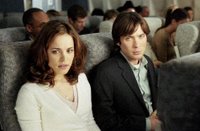
Red Eye Red Eye succeeds because it has no illusions about what it is. It’s a thriller with a pretty straightforward premise and goes on no longer than it should. Every secondary character gets one or two nice little touches or scenes, but the biggest strength of the film is that the two main characters are never stupid. That is very, very rare. Virtually every move, every counter we in the audience can think of, they try, plus a few we might not think of. Cillian Murphy shows with Red Eye and Batman Begins he can play a creepy villain, and the lovely, talented Rachel McAdams shows she has the range and charisma to carry a film.
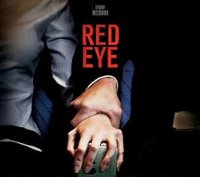
(If you note the poster detail, you’ll see a subliminal touch — the woman’s hand has been altered so that it resembles a claw, with the pinkie finger unnaturally oriented, long, and jagged... all of which is a bit ironic, since she’s not the villain, but since gents typically don’t wear their nails long...)
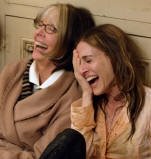 The Family Stone Family Stone features quite a strong cast and forms a pleasant enough diversion. My only quibble is that to advertise it, the studios used the photo to the left, and the clip of the scene to the left, almost exclusively. Not that I’m surprised... But while Family Stone has plenty of comic moments, it really is more of a drama. Diane Keaton and Luke Wilson are standouts, but I also found it a nice change of pace to see little miss adorable, Sarah Jessica Parker, play a bigoted tightass.
The Family Stone Family Stone features quite a strong cast and forms a pleasant enough diversion. My only quibble is that to advertise it, the studios used the photo to the left, and the clip of the scene to the left, almost exclusively. Not that I’m surprised... But while Family Stone has plenty of comic moments, it really is more of a drama. Diane Keaton and Luke Wilson are standouts, but I also found it a nice change of pace to see little miss adorable, Sarah Jessica Parker, play a bigoted tightass. 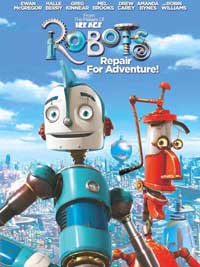 Robots Robots continues the current big studio animation trend of taking some excellent voice talent (Robin Williams, Mel Brooks, Jennifer Coolidge, Paul Giamatti, Ewan MacGregor) and some famous but unexceptional voice talent (Halle Berry), throwing in some nice visuals, but marrying it all to a lackluster, unengaging storyline. While the film does offer some genuine laughs, and an impromptu robot fart contest is sure to win over younger viewers, the final product is unmemorable enough that it almost missed inclusion here (for better or worse!).
Robots Robots continues the current big studio animation trend of taking some excellent voice talent (Robin Williams, Mel Brooks, Jennifer Coolidge, Paul Giamatti, Ewan MacGregor) and some famous but unexceptional voice talent (Halle Berry), throwing in some nice visuals, but marrying it all to a lackluster, unengaging storyline. While the film does offer some genuine laughs, and an impromptu robot fart contest is sure to win over younger viewers, the final product is unmemorable enough that it almost missed inclusion here (for better or worse!). 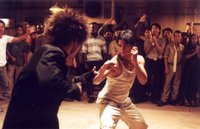 Ong-Bak: The Thai Warrior (released in Thailand in 2003) This film, nominally about a villager trying to recover the head of a sacred Buddha statue, is really nothing more than a showcase for the amazing martial arts skills of Tony Jaa. Case in point... in one sequence where he’s being chased down a busy road by the bad guys, he winds up diving through a ring of barbed wire and doing a standing side flip between two panes of glass. It’s ludicrous and contrived, but we don’t care, because Jaa is his own special effect. I must say that the film does not look that great — it appears like it was shot on a fairly cheap digital format prior to being blown up and transferred to 35mm. Still, if you enjoy martial arts flicks, check this out, and let’s hope Jaa’s talents are put in better showcases in the future.
Ong-Bak: The Thai Warrior (released in Thailand in 2003) This film, nominally about a villager trying to recover the head of a sacred Buddha statue, is really nothing more than a showcase for the amazing martial arts skills of Tony Jaa. Case in point... in one sequence where he’s being chased down a busy road by the bad guys, he winds up diving through a ring of barbed wire and doing a standing side flip between two panes of glass. It’s ludicrous and contrived, but we don’t care, because Jaa is his own special effect. I must say that the film does not look that great — it appears like it was shot on a fairly cheap digital format prior to being blown up and transferred to 35mm. Still, if you enjoy martial arts flicks, check this out, and let’s hope Jaa’s talents are put in better showcases in the future. 
Casanova (Look, ladies, I’m straight! Really I am! And if that doesn’t convince you, see the spread in People and Us that show me with my cute young wife Michelle Williams and our new baby! See, even though I got it on with Jake in the film, now you can write about the true love story of Brokeback Mountain... ) I never expected this film to be much of anything but some silly fun, and for the first half or so, it manages to be an enjoyable enough romp with some clever touches. However, at a certain point it just — becomes — too — silly, at least for me. It’s not quite Shakespeare in Love, or Dangerous Beauty, or The Three Musketeers, or any of a dozen other films... There are worse ways to spend your time, but also far better.

No comments:
Post a Comment